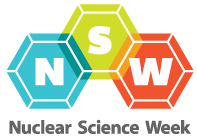Approaching basic aspects of nuclear science requires an interest in the inner workings of our natural world. Nuclear technology is based around the reactions of atomic nuclei, which are different from ordinary chemical reactions. The energy generated by atoms can be used to power many things, from medical equipment to military-grade weaponry and even our own homes.
Although the German scientist Martin Klaproth discovered uranium in 1789, nuclear science as a discipline didn't develop until the 1890s. Marie and Pierre Curie coined the word "radioactivity" in 1896, and they later isolated polonium and radium from a substance called pitchblende. Scientists began the exploration of medical applications using radiation in the late 1800s, but Samuel Prescott in 1898 demonstrated the usefulness of radiation when it comes to destroying bacteria in food.
During World War II, several different countries-including the United States-strove to develop an atomic bomb after the discovery of nuclear fission. Following the events at Hiroshima and Nagasaki and the resolution of global conflict, scientists began looking for peaceful applications of radiation. During that same decade, both the United States and the Soviet Union developed the first nuclear submarines.
In the 1970s and 80s, incidences at Three Mile Island and Chernobyl caused many people to reconsider the safety and wisdom of using nuclear energy as a power source. As a result of these tragic accidents, the industry hit a point of stagnation for several decades and saw few new reactors being built.
Today, in light of global population growth and the looming threat of climate change, the vast potential of nuclear power as a clean source of energy has reinvigorated interest in its success. Over the past 150 years, carbon dioxide levels in the atmosphere have risen from 280 ppm to 400 ppm-and the Intergovernmental Panel on Climate Change has concluded that there's a 90 percent probability humans are responsible. Nuclear energy has a much lower carbon footprint than any of the fossil fuels we currently rely on. It is also much more efficient: in fact, according to Direct Energy, the amount of energy released from uranium per gram is about 8000 times more efficient that of fuels such as oil or coal.
Greenhouse gas emissions from nuclear power are on par with solar and wind electricity generation. Fossil fuel burning spreads massive amounts of sulfur oxides, nitrogen oxides, and heavy metals into the atmosphere, none of which are produced by nuclear power plants. Nuclear is a "green" source of baseload always-on electricity, promoting healthy air and water quality.
Nuclear power is not only cleaner than any of the fossil fuels, its reactors take up less land space than other forms of power generation. A nuclear plant that produces 1000 MW of electricity requires 1 to 4 square km, while a wind farm of the same capacity would need 50 to 150 km and a solar array would need 20 to 50 km. Nuclear energy is also more reliable than either solar or wind power, whose productivity depends on the weather.
The revival of the nuclear power industry and its role in combating climate change presents a terrific opportunity for young people. They will need the appropriate education in order to take advantage of it.
Nuclear Science Week and its associated events can help provide guidance on the best ways to educate students about nuclear power and its benefits.
_______________________________________________________
 Beth Kelly is a freelance science writer with a strong interest in nuclear power and its potential as a clean energy source. A graduate of DePaul University, she is currently based out of Chicago, Ill. Find her on Twitter at @bkelly_88.
Beth Kelly is a freelance science writer with a strong interest in nuclear power and its potential as a clean energy source. A graduate of DePaul University, she is currently based out of Chicago, Ill. Find her on Twitter at @bkelly_88.
 This year, Nuclear Science Week takes place October 19-23. Always during the third week of October, it's a nationwide event that has been educating people about the importance of nuclear science and technology for the past five years. Many of the associated Nuclear Science Week events, taking place all week throughout the United States, are aimed toward young people to encourage an interest in nuclear science-related careers. This year, the first day's theme will be "Get To Know Nuclear"-a topic kids (and adults) of all ages would do well to learn.
This year, Nuclear Science Week takes place October 19-23. Always during the third week of October, it's a nationwide event that has been educating people about the importance of nuclear science and technology for the past five years. Many of the associated Nuclear Science Week events, taking place all week throughout the United States, are aimed toward young people to encourage an interest in nuclear science-related careers. This year, the first day's theme will be "Get To Know Nuclear"-a topic kids (and adults) of all ages would do well to learn.

 Beth Kelly is a freelance science writer with a strong interest in nuclear power and its potential as a clean energy source. A graduate of DePaul University, she is currently based out of Chicago, Ill. Find her on Twitter at
Beth Kelly is a freelance science writer with a strong interest in nuclear power and its potential as a clean energy source. A graduate of DePaul University, she is currently based out of Chicago, Ill. Find her on Twitter at